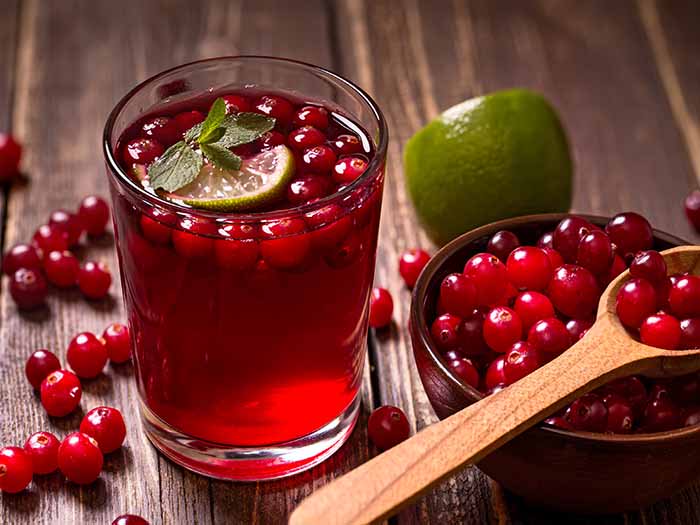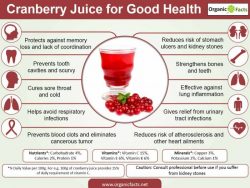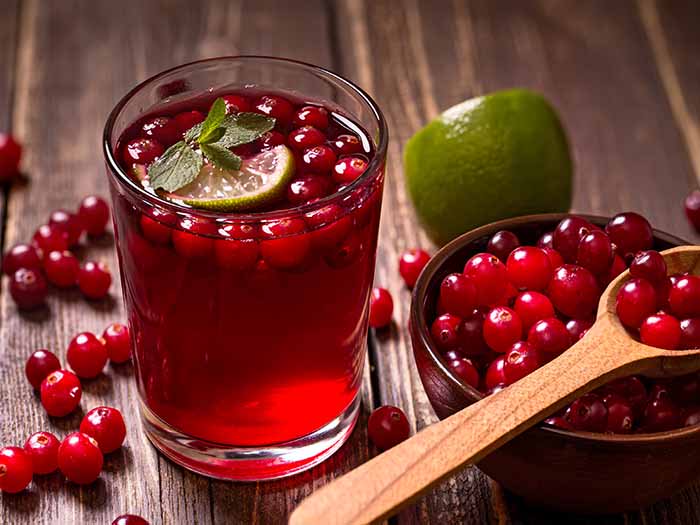Health
Amazing Health Benefits Of Cranberry Juice
Published
5 years agoon
By
Publisher
By Kiran Patil
Cranberry juice has many amazing health benefits including the prevention of age-related oxidative damage, reduction in heart and other chronic diseases, and treatment of UTI and other infections. It also helps improve digestion and supports post-menopausal health.
It is also beneficial in preventing stomach disorders and diabetes, as well as gum diseases caused by dental plaque. Phytonutrients, which are naturally derived plant compounds, are present in the fruit juice and have been found to prevent a wide range of health problems.
What is Cranberry Juice?
Cranberry juice is made from cranberries, which are one of the native fruits of North America. The juice is rich in nutrients and is used in food as well as in medicinal products. Cranberries are members of the Ericaceae family.
The Latin name for the cranberry plant is Vaccinium macrocarpon. Cranberries have a tremendous amount of antioxidant capacity as compared to other vegetables and fruits like broccoli, spinach, and apples. One cup of cranberries measures a total of 8983 antioxidant capacity.

What is Cranberry Juice Good for?
Cranberry juice, made from the fruit extract or cranberry concentrate, is used to make various sauces and cocktails. These cocktails are approximately 30% pure cranberry juice mixed with artificial sweetener or fructose. About one liter of juice can be extracted from 1500 grams of fresh cranberries.
The fruit extract is also used to make medicines, gels, and tonics. Dried cranberries are also very healthy and can be enjoyed with breakfast cereals, energy bars, granola bars, trail mixes, and can be added to muffins.
Cranberry Juice Nutrition
According to USDA Nutrition Data, cranberry juice has an abundant supply of antioxidants, proteins, carbohydrates, vitamins, and minerals. Cranberry juice is rich in vitamin C and salicylic acid and in terms of minerals, it contains calcium, magnesium, iron, phosphorus, and potassium. It also contains vitamins like thiamin, riboflavin, niacin, vitamin B6, and vitamin E (alpha-tocopherol). Other nutrients in cranberry juice include sodium, zinc, vitamin A, folate, and vitamin K (phylloquinone).
By containing fewer calories per cup, cranberry juice fits very well within the dietary guidelines. This juice is 87% water.
Health Benefits of Cranberry Juice
Cranberry juice has long been used for curing various illnesses. The health benefits of cranberries include the following.
ALSO READ:13 Impressive Benefits Of Physical Activity
Cranberry Juice helps treat urinary tract infection – Cranberry Juice for UTI (Urinary Tract Infections)
Studies done by a team at Rutgers University have shown that cranberry juice contains proanthocyanidins that possess anti-clinging properties, which prevent the bacteria from binding itself to the cells on the walls of the bladder. These compounds prevent bacteria from multiplying further and flush them out of the body through urination.
Urinary tract infections (UTI) refer to the existence of certain micro-organisms, mainly E. coli, in the urine that exceed normal levels. These infections can develop in the bladder and cause cystitis in the kidney that leads to renal parenchyma, or in the prostate, resulting in bacterial prostatitis.
Researchers at the Los Angeles Biomedical Research Institute found that drinking cranberry juice regularly can help prevent recurring UTIs in middle-aged and pregnant women. It is beneficial in reducing the risk of UTI amongst women undergoing elective benign gynecological surgery.
The study published in the Journal of Urology also suggests that cranberry juice may help in preventing pediatric urinary tract infection. However, cranberry juice is not effective in treating UTIs and is only a preventative measure.
Fights Age-related Oxidative Damage
A research published at the Department of Biological Sciences, Clemson University, Clemson, USA, suggests that the wealth of phytonutrients and antioxidants present in cranberries play a vital role in providing protection against the problems that develop with age, such as memory loss, diabetes, and lack of coordination among others.
Cranberries have a number of therapeutic properties that protect the cells from damage caused by unstable molecules called free radicals that contribute to aging, thereby making your skin look younger.
Improves Heart Health
Cranberry juice can help lower the risk of heart diseases and assist in sustaining cardiovascular health. A study published at the Department of Animal Sciences, University of Wisconsin-Madison, USA, suggests that the flavonoids present in cranberries have antioxidant properties and may decrease the threat of atherosclerosis.
Atherosclerosis is a disease in which the arteries are narrowed due to the build-up of fat, calcium, and cholesterol found in blood. This obstructs the flow of oxygen-rich blood to various parts of the body and may lead to potentially fatal outcomes like heart attacks and strokes. Research suggests that the presence of these compounds in cranberries help delay and suppress the oxidation of low-density lipoprotein (LDL cholesterol) and stimulate the blood platelets.
Improves Digestion
Cranberry juice is rich in phytochemicals and thereby known to help improve the digestion in your body. It also prevents the formation of peptic ulcers. Peptic ulcers are caused by a type of bacteria called Helicobacter pylori or H. pylori. This microorganism attacks the protective layer of the stomach and duodenum. This may lead to further inflammation of the stomach lining.
Foods rich in flavonoids, a category that includes anthocyanins, flavonols, and proanthocyanidins, like cranberries, apples, and garlic help reduce the risk of stomach disorders, including stomach ulcers, by inhibiting the growth of H. pylori bacteria.
Prevents Cancer
Cranberry contains proanthocyanidins, which inhibit the growth of various cancer cells. Studies have suggested that diets rich in flavonoids play a fundamental role in reducing the risk of cancer as well as cancer mortality. Cranberry juice contains anti-carcinogenic components that interfere with the growth of cancer cells, particularly those associated with colon and prostate cancer.
According to another study, conducted at the Department of Biology, University of Prince Edward Island, Canada, proanthocyanidins can stop micro-tumors from developing in the blood vessels. Chemicals in organic cranberries also prevent the multiplication of breast cancer cells.
Treats Infections
According to a study conducted in 2010, cranberry juice helps inhibit certain strains of the Haemophilus influenza, which is a common cause of ear and respiratory infections in children. The juice inhibits the bacteria’s hair-like structures, inhibiting them from adhering to the surface of the skin.
Cranberry juice also has antimicrobial effects on the body and is thereby known to fight against seven bacterial strains. It is also effective against norovirus as per research.
Antitumor Effects
The anti-tumor efficacy offered by cranberry juice is attributed to the presence of polyphenolic compounds within the fruit. A study led by Dr. Polly Ferguson, Department of Physiology & Pharmacology, University of Western Ontario suggested that regular consumption of cranberry juice inhibits the development and spread of lung, breast, colon, prostate, and other cancers. Cranberry juice contains a high amount of salicylic acid which can help reduce swelling, prevent blood clots, and eliminate tumors.
Benefits of Cranberry Juice
Improves Post-menopausal Health
Cranberry juice prevents the risk of heart diseases in postmenopausal women by lowering the cholesterol levels in the body. According to a research conducted at the Department of Medicine, Brigham and Women’s Hospital, Harvard Medical School, Boston, USA, “Our data demonstrate the novel cardiovascular benefits of cranberry juice consumption in improving both vascular functions and cholesterol profiles, providing insight into developing cranberry products into useful dietary supplements for postmenopausal women”.
Prevents Tooth Decay
According to new research studies, cranberry juice prevents tooth cavities. Proanthocyanidins, a chemical compound present in cranberries, inhibits harmful bacteria from clinging to teeth. These components inhibit acid production and protect the teeth from periodontal diseases by preventing the growth of plaque.
Good oral hygiene, along with the consumption of organic premium dried cranberries, disrupts the pathogenic mechanism of dental caries and generally makes for good dental health. At the same time, one should watch out for the soaring sugar content and the acidity of some commercially available juices – natural cranberry juice is always better!
Other Benefits
There are many other benefits of cranberry juice, let’s take a look at them.
Strengthens Bones and Teeth: Although cranberry juice is a natural source of calcium, many juice companies add extra calcium. Natural or otherwise, calcium reduces the risk of getting osteoporosis.
Cures Cold: Fresh cranberry juice is effective in fighting infections. It cures sore throats and colds.
Weight Loss: Cranberry juice is rich in organic acids, which have an emulsifying effect on the fat deposits in our body. So, it is good for people who want to shed those extra kilos.
Prevents Kidney Stones: The high amount of acid components in cranberry juice prevent kidney stone formation.
Prevents Scurvy: Deficiency of vitamin C in an individual can result in scurvy. Sparkling cranberry juice provides high levels of vitamin C, which is also vital for the body to make collagen, the main component responsible for the healthy functioning of tissues.
Treats Lung Inflammation: The anti-inflammatory effects of this juice have been proven to be effective against the inflammation caused in the lungs by the influenza virus. A substance called nondialyzable material or NDM present in cranberries prevent the influenza virus from sticking to the cells, hence preventing a flu infection.
Side Effects of Cranberry Juice
Cranberries and cranberry juice offer a variety of health benefits, barring the few exceptions listed below:
Warfarin (Coumadin): Warfarin is an anticoagulant drug that is used as a blood thinner, and it lowers the chances of blood clots occurring in the body. These blood clots can further result in serious conditions like cardiovascular disorders or clots in the legs, lungs, and other parts of the body. There are indications that people who take warfarin should be cautious regarding the intake of cranberry, as they are at a high risk of bleeding. Excess consumption of cranberry juice is not recommended for these people as it may affect the efficacy and safety of warfarin in the body. In such cases, it is always advisable to regularly get your blood tested in order to consume the correct dose of the medication.
Aspirin allergy: Cranberries contain substantial quantities of salicylic acid, which is also present in aspirin. People who need blood thinners and are prescribed aspirin should avoid consuming too much cranberry juice. Intake of cranberries should also be restricted if you are allergic to aspirin.
Kidney stones: Cranberry extracts contain a significant concentration of oxalate and calcium. This amplifies the chances of developing calcium-oxalate stones and uric acid stones in certain people. People who have kidney stones or have a history of kidney stones should consult a medical professional before consuming cranberry supplements or a large amount of cranberry juice. Studies have provided evidence that the juice can raise the level of oxalate in the urine by up to 43%.
Cranberry extracts have been used to deodorize urine in some people who have complications in controlling urination, also known as urinary incontinence. The extracts can prevent the urinary catheters from blocking and speed up the curative process of the membrane around the stomach.
- Culled from www.organifacts.net
Trending

 Football2 days ago
Football2 days agoGuardiola advised to take further action against De Bruyne and Haaland after both players ‘abandoned’ crucial game

 Business1 week ago
Business1 week agoDollar crashes further against Naira at parallel market

 Business1 week ago
Business1 week agoRecapitalisation: Zenith Bank to raise funds in international capital market

 Education1 week ago
Education1 week agoArmy reveals date for COAS 2024 first quarter conference

 Crime1 week ago
Crime1 week agoFleeing driver injures two on Lagos-Badagry expressway

 Covid-191 week ago
Covid-191 week agoBritish legislator demands Bill Gates, other ‘COVID Cabal’ faces death penalty

 Latest6 days ago
Latest6 days agoIsrael pounds Hezbollah with airstrikes after Iran attack

 Business1 week ago
Business1 week agoZenith Bank surpasses N2trn earnings milestone


